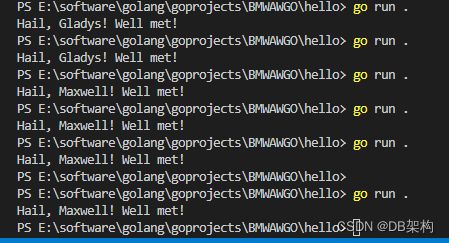Go for Return Day1 20230919
Return and handle an error
In greetings/greetings.go, add the code below.
package greetings
import (
"errors"
"fmt"
)
// Hello returns a greeting for the named person.
func Hello(name string) (string, error) {
// If no name was given, return an error with a message.
if name == "" {
return "", errors.New("empty name")
}
// If a name was received, return a value that embeds the name
// in a greeting message.
message := fmt.Sprintf("Hi, %v. Welcome!", name)
return message, nil
}2.In your hello/hello.go file, handle the error now returned by the Hello function, along with the non-error value.
package main
import (
"fmt"
"log"
"example.com/greetings"
)
func main() {
// Set properties of the predefined Logger, including
// the log entry prefix and a flag to disable printing
// the time, source file, and line number.
log.SetPrefix("greetings: ")
log.SetFlags(0)
// Request a greeting message
message, err := greetings.Hello("")
// If an error was returned , print it to the console and exit the program.
if err != nil {
log.Fatal(err)
}
// If no error was returned , print the returned message to the console.
fmt.Println(message)
}
3.At the command line in the hello directory, run hello.go to confirm that the code works.
Return a random greeting
- Add a
randomFormatfunction that returns a randomly selected format for a greeting message. Note thatrandomFormatstarts with a lowercase letter, making it accessible only to code in its own package (in other words, it's not exported). - In
randomFormat, declare aformatsslice with three message formats. When declaring a slice, you omit its size in the brackets, like this:[]string. This tells Go that the size of the array underlying the slice can be dynamically changed. - Use the math/rand package to generate a random number for selecting an item from the slice.
- In
Hello, call therandomFormatfunction to get a format for the message you'll return, then use the format andnamevalue together to create the message. - Return the message (or an error) as you did before.
package greetings
import (
"errors"
"fmt"
"math/rand"
)
// Hello returns a greeting for the named person.
func Hello(name string) (string, error) {
// If no name was given, return an error with a message.
if name == "" {
return name, errors.New("empty name")
}
// Create a message using a random format.
message := fmt.Sprintf(randomFormat(), name)
return message, nil
}
// randomFormat returns one of a set of greeting messages. The returned
// message is selected at random.
func randomFormat() string {
// A slice of message formats.
formats := []string{
"Hi, %v. Welcome!",
"Great to see you, %v!",
"Hail, %v! Well met!",
}
// Return a randomly selected message format by specifying
// a random index for the slice of formats.
return formats[rand.Intn(len(formats))]
}
package main
import (
"fmt"
"log"
"example.com/greetings"
)
func main() {
// Set properties of the predefined Logger, including
// the log entry prefix and a flag to disable printing
// the time, source file, and line number.
log.SetPrefix("greetings: ")
log.SetFlags(0)
// Request a greeting message.
message, err := greetings.Hello("Maxwell")
// If an error was returned, print it to the console and
// exit the program.
if err != nil {
log.Fatal(err)
}
// If no error was returned, print the returned message
// to the console.
fmt.Println(message)
}
At the command line, in the hello directory, run hello.go to confirm that the code works. Run it multiple times, noticing that the greeting changes.
Return greetings for multiple people
package greetings
import (
"errors"
"fmt"
"math/rand"
)
// Hello returns a greeting for the named person.
func Hello(name string) (string, error) {
// If no name was given, return an error with a message.
if name == "" {
return name, errors.New("empty name")
}
// Create a message using a random format.
message := fmt.Sprintf(randomFormat(), name)
return message, nil
}
// Hellos returns a map that associates each of the named people
// with a greeting message.
func Hellos(names []string) (map[string]string, error) {
// A map to associate names with messages.
messages := make(map[string]string)
// Loop through the received slice of names, calling
// the Hello function to get a message for each name.
for _, name := range names {
message, err := Hello(name)
if err != nil {
return nil, err
}
// In the map, associate the retrieved message with
// the name.
messages[name] = message
}
return messages, nil
}
// randomFormat returns one of a set of greeting messages. The returned
// message is selected at random.
func randomFormat() string {
// A slice of message formats.
formats := []string{
"Hi, %v. Welcome!",
"Great to see you, %v!",
"Hail, %v! Well met!",
}
// Return a randomly selected message format by specifying
// a random index for the slice of formats.
return formats[rand.Intn(len(formats))]
}
package main
import (
"fmt"
"log"
"example.com/greetings"
)
func main() {
// Set properties of the predefined Logger, including
// the log entry prefix and a flag to disable printing
// the time, source file, and line number.
log.SetPrefix("greetings: ")
log.SetFlags(0)
// A slice of names.
names := []string{"Gladys", "Samantha", "Darrin"}
// Request greeting messages for the names.
messages, err := greetings.Hellos(names)
if err != nil {
log.Fatal(err)
}
// If no error was returned, print the returned map of
// messages to the console.
fmt.Println(messages)
}

